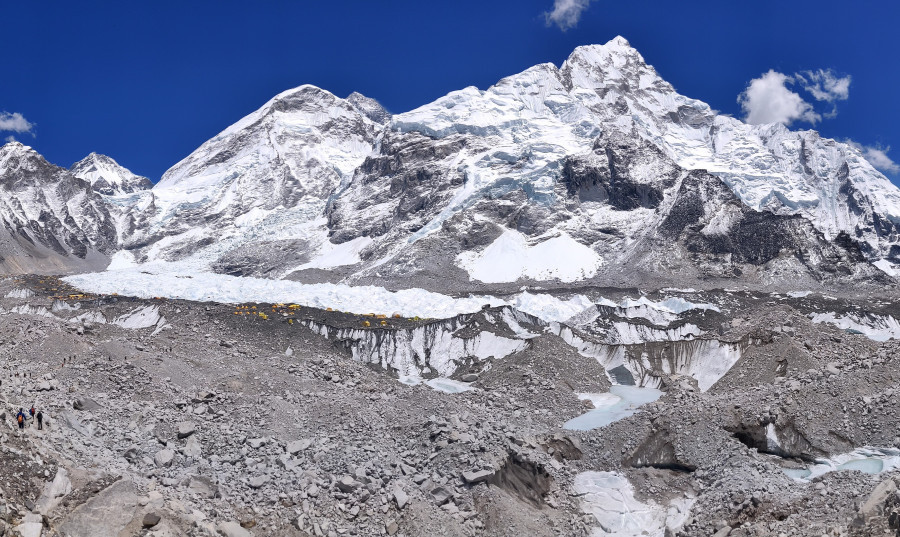Columns
Focus on climate change
Considering the gravity of climate impacts, there should be a parliamentary committee to deal with them.
Madhukar Upadhya
Despite promises made by governments to cut carbon emissions over successive Conference of Parties (COP) meetings since 2015, greenhouse gas emissions continued to increase rapidly in 2022. A slight decrease in emissions in 2020 due to the pandemic demonstrated how such a reduction would save the earth from a series of possible climate catastrophes. The message, however, seems to have been ignored bluntly in favour of the greed for fossil fuel-led economic growth. The latest and most prominent example is the United States. Despite opposition from environmentalists due to its adverse impacts on climate change, the Biden administration approved a huge oil drilling project in Alaska a month ago. Such decisions make it less likely that the global community will achieve a 43 percent reduction in greenhouse gas emissions by 2030 as outlined by the Paris goals of limiting global warming to 1.5 degrees Celsius.
New evidence and facts
As planetary heating continues unabated, new evidence and facts about its impacts are emerging every day. Following a dramatic rise in sea surface temperatures, scientists warn that an extreme El Niño is likely to occur this year, which will not only have a direct impact on the monsoon rain that we so desperately depend on for our regional economic activities, including food production, but may also further add to global warming with consequences thereupon. The impacts of planetary heating on the jet streams and the persistent warming of the Indian Ocean have already been felt in the suppression of the westerlies that bring much needed rain and snow during the winter months. Now the steady warming of the oceans is also expected to impact ocean circulation—one of the key stabilising forces of the global climate system. On the terrestrial front, a recent study on the melting glaciers indicated that our understanding of the issues needs to be revisited as new facts emerge. Accordingly, the previous assessments of loss of lake-terminating glaciers in the Himalaya seems to have underestimated the loss by at least 6.5 percent. In sum, the climate crisis has already deepened.
These climate worries continue to pile up on top of many other pressing problems that we face at home. “Delivery” has become a catchword in our political discourse in recent times implying that successive governments have failed to fulfil their promises of growth and development, with people growing disillusioned with the key political parties that have been in power for over three decades. The snowballing results of years of poor governance and mismanagement of economic affairs have started to surface. The economic distress caused by the reconstruction and rehabilitation after the earthquake in 2015, further weakened by the global pandemic since 2020, has already left a deep incision in the national economy. We'd hardly seen any signs of recovery to the pre-pandemic rhythm, and now the country seems to be sliding back into a recession not seen in the last six decades. Key economic sectors plunged sharply. The mining and quarrying, transportation as well as construction sectors have seen negative growth in the second quarter of the fiscal year.
Nepal hasn't lived through such troubling times in recent memory. Agriculture has suffered due to floods and landslides, untimely rains and prolonged droughts. Reconstruction and rehabilitation of damaged infrastructure and displaced people are an additional burden on the national coffers which have seen better days. Development priorities have been in disarray for decades. The production sectors have been losing confidence due to our import-centric policies, without which the government couldn't even maintain base revenue levels. Imports are largely supported by the remittance sent home by migrant workers. Frequent change in governments has drained the existing institutions of their ability to deal with the worsening economic situation. Our immediate priorities have pushed climate concerns to the periphery of the policy arena.
Situation of urgency
On a very optimistic note, one could argue that we can always deal with economic issues by taking stringent measures to enhance our institutional capacity and improve governance. This is because we know where the problems are emanating from and how they manifest, but it's not as simple with the added pressures of mounting climate impacts. Examples of floods and droughts that we have witnessed lately are only a preview of what awaits us. What will happen when the westerlies are further suppressed by planetary heating, or when an extreme El Niño develops bringing with it its severe consequences? How will the resulting events impact our economic, physical and social infrastructures? Under the guidance of experts, the answers to these questions should be sought in Parliament, which has a key role to play in monitoring how public funds are used effectively to assist communities in reducing growing climate risks while executing development programmes.
The newly elected federal Parliament recently formed its parliamentary committees. Unsurprisingly, it failed to form a dedicated environment/climate committee to assure us that the country affords high priority to the protection of our environment. Cross-cutting issues such as the environment and climate change cannot be dealt with in other committees where programmes with sectoral scopes are discussed. Considering the gravity of the growing climate impacts and the fact that we need to centre climate change in the decision-making process, it should have been afforded the highest priority while forming committees so that the diverse constituencies facing these impacts would have been represented during these crucial Parliament deliberations. Unfortunately, that is unlikely to happen now.
We have less than seven years left to meet the Agenda 2030. The time for piloting and learning is gradually slipping away as climate consequences are already being felt over a wider area—be it in terms of climate-induced disasters or a loss of environmental assets. It’s time to put talk into action by recognising climate change as the cross-cutting, intersectional issue that needs to be at the heart of all decision-making of governments from the federal to the local levels. Both private and public agencies that deal with economic activities must be equally engaged and invested. But key questions remain. How can we bring climate change into all decision-making, particularly that of local governments, when we don’t even have a clear understanding of climate impacts at that level? And who will provide directives to do so to all 753 local governments located across such diverse geography?
Despite years of efforts to emphasise economic growth and progress in all spheres of society, deliberations in Parliament and emphasis in the manifestos of the political parties, we couldn’t stop our economy from slipping into a recession. In such a circumstance, there is very little we can expect from the current modus operandi to protect our economy and environment from climate woes, which sadly remain mostly absent from public discourse. This is a matter of serious concern, and we must feel a sense of urgency when acknowledging it. The success of climate policies, plans and strategies will depend primarily on how, and with what degree of gravity, we begin to make decisions climate-responsive at all levels of government.




 17.12°C Kathmandu
17.12°C Kathmandu















